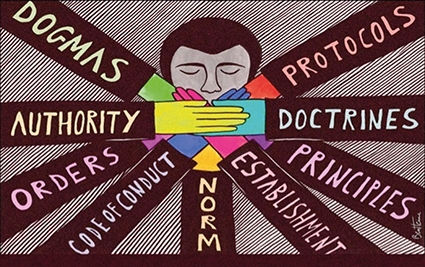New Bill Will Allow Court to Ban Creative Works
The ruling Georgian Dream (GD) lawmakers, Eka Beselia and Levan Gogichaishvili, have written up a bill which gives power to the court to ban some creative works, including writings.
In particular, the bill envisages making amendments to the Law of Georgia on "Culture" and "Civil Procedure Code," which allows a judge to prohibit creative works that stir national, ethnic, religious and racial hatred, preaches war and violence, or propagates pornography.
“Prohibition of the dissemination of a creative work is allowed only on a court decision,” the bill reads.
According to the draft law, the amendment will take effect right after the upcoming presidential elections, when the president-elect takes oath at the inaugural ceremony.
According to NGO Georgian Young Lawyers Association (GYLA) lawyer Giorgi Gotsiridze, this prohibition is not a novelty because the Law on Culture, which was adopted in 1997, has a similar record.
However, he says the difference is that the bill introduces a specific mechanism for executing this prohibition - the court.
Georgia-based NGOs believe the draft creates threats to freedom of expression. Transparency International Georgia says the draft law, in its current form, contradicts the fundamental principles of human rights and threatens the freedom of expression and creativity, especially works of art and literature.
“We call on Parliament not to support the proposed draft law and to refine the existing similar record in conformity with the Constitution. For Georgia, which is a young democratic country, the main aim of which is EU integration, freedom of expression is one of the most important values. Each legislative amendment which threatens the restriction of freedom of expression poses a danger to the country's democratic development,” the NGO stated.
Meanwhile, writer Lasha Bughadze assessed the draft as a return to a “totalitarian past.”
"Any interference in the art space means censorship, restriction of freedom of speech and freedom of expression. This is a very dangerous bill that is aimed at controlling people,” he stressed.
The draft author, Eka Beselia, says the amendments do not impose any censorship, adding this record is not new.
“The process of harmonization of the Constitution is underway, which means that amendments will be made to hundreds of laws in the near future. One of them is this bill. The Constitution states that censorship is not allowed in creative work. If the Court does not say that this right may be restricted, no one can prohibit any creative works,” she explained.
By Thea Morrison












